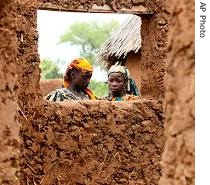2006年VOA标准英语-Sudan UNICEF Advancing Girls' Education in Nort(在线收听)
By Gilbert da Costa
Abuja
29 October 2006
The United Nations, in collaboration with the Nigerian government, has launched an ambitious girls' education program to boost gender parity in primary schools. The program is focusing on the northern region, where girls' enrollment is very low.
Millions of girls are expected to benefit from the initiative that supports key projects and activities, such as classroom construction and rehabilitation, procurement of books, and educational campaigns to track and enroll young girls.

Girls stand outside their home in Todo village, near Ilorin, Nigeria
Girls' education in northern Nigeria lags behind boys in basic literacy, perpetuating a cycle of inequality and poverty that impedes developing societies from achieving their full potential.
The program seeks to create a girl-friendly environment in school as the first step, as Mohammed Jallo of UNICEF explains.
"We found out that, one of the reasons parents do not want to send their girls to school is that they believed conditions in the schools are not girl-friendly," said Jallo. "For example, most of the schools do not have toilet facilities, separate ones for boys and girls. So, we go to the schools, and we help provide toilet facilities, separate ones for boys and girls. We provide bore holes, so that the children can have access to water during the time they are in school. We also help in the provision of books. We assist in the training of teachers to improve their skills and competencies. We also support in the supervision of teachers, and we also help in some logistics. We advocate with governors and chairmen to provide additional support, in terms of posting of teachers to the schools, especially female teachers."
The initiative is addressing deep-seated cultural and religious challenges, such as forced marriages.
Most states in Muslim-dominated northern Nigeria have adopted strict Islamic sharia law, which many analysts see as an additional gender barrier to education.
UNICEF recruits local community support to overcome barriers and reverse long-held misconceptions about girls' education. Jallo says religious and political leaders are included.
"We have been able to support the formation of what we call school-based management committees, getting parents and community members involved in doing the mobilization at the community level," he added. "So, they are the ones now going to the individual households, identify children who are out of schools, and educating and sensitizing the parents and encouraging them to send their children to school. And we are seeing enrollment increasing. And with the recent campaigns, because the governors and chairmen and religious leaders, the emirs going out and talking to parents, and even doing the registration themselves, and that adds another level of motivation."
UNICEF is providing $47 million for the first phase of the project, with additional funding from the Nigerian and British governments.